A head peered out the Ryvoan Bothy door: “we’ve got the fire really going inside, can we make you guys a pot of tea?!” The tiny stone hut was full with a big group of Czech hikers who must have seen Stef, Leonie, Harry and Jordan arrive through the small, solitary window overlooking the groomed gravel pass. Or, heard them at least – their freewheeling hubs ticking to a stop; their sighs of relief. ‘Twas 21.00, and the rouge Cairngorm hills were still lit beneath spring sundowner skies; a warming end to their first day riding the Loop through all weathers…
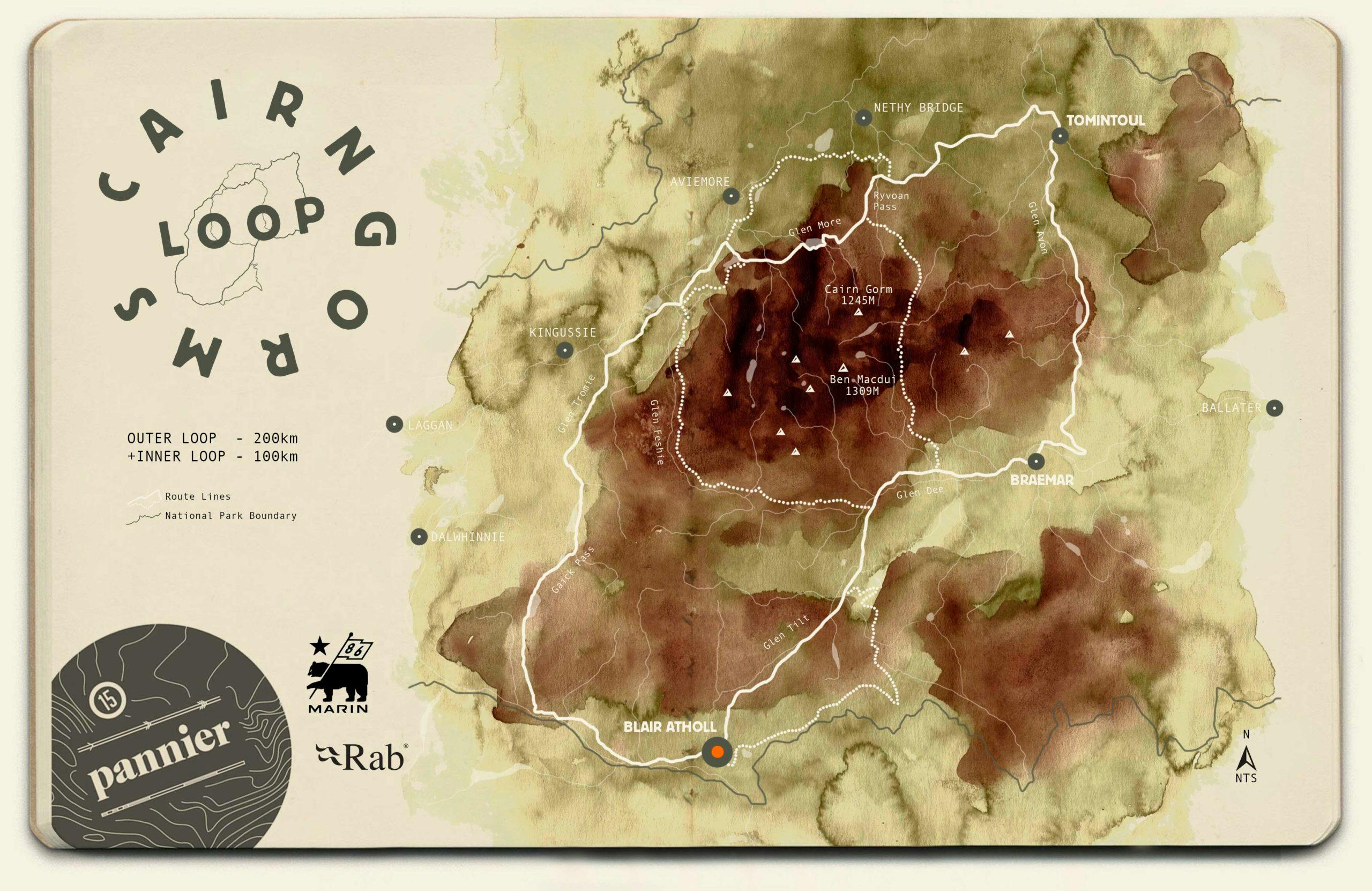
[as featured in Grand Bikepacking Journeys – a new large-format book on 23 iconic bikepacking routes around the world]

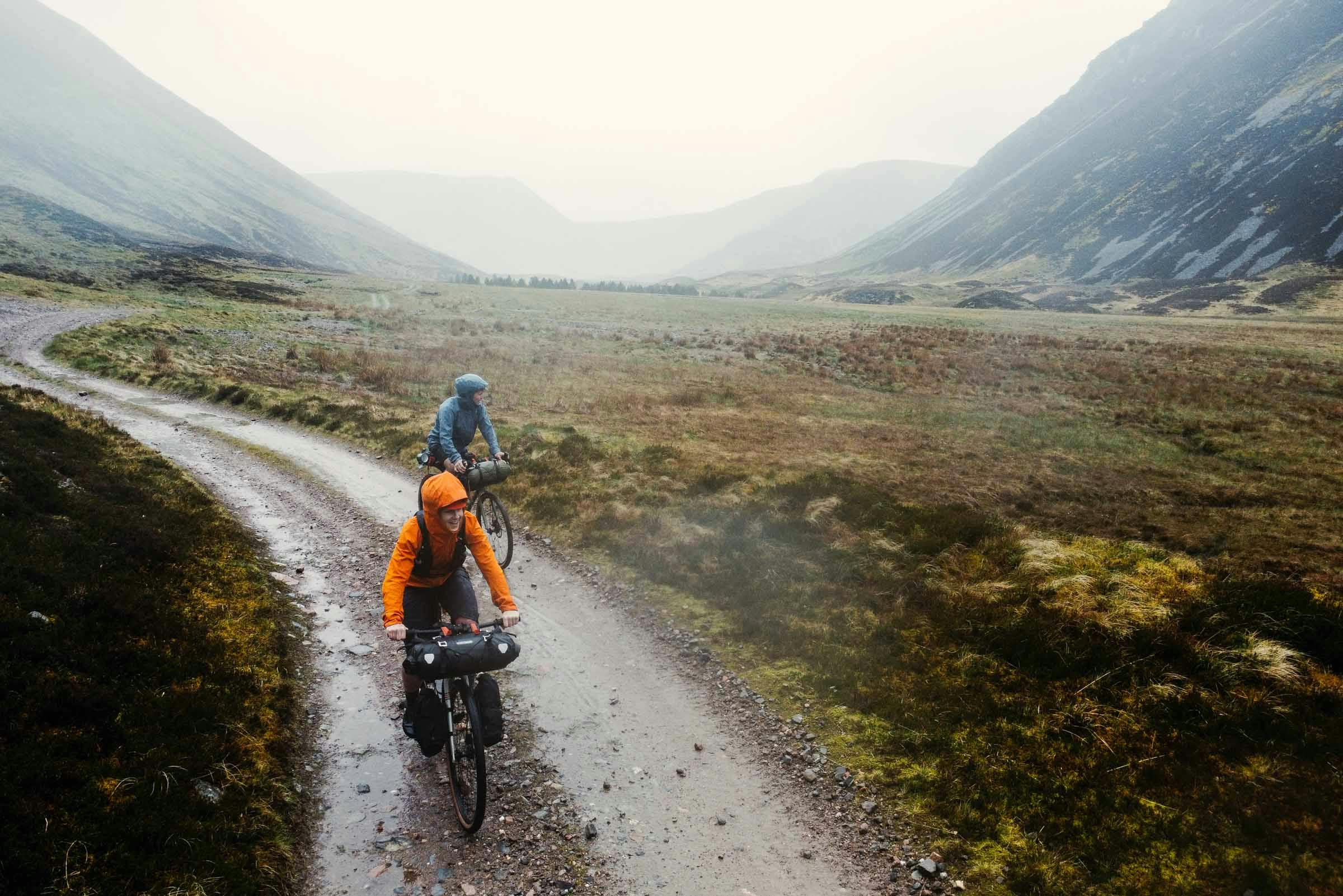
The Cairngorms Loop is one of the classic bikepacking routes, nestled in the Scottish Highlands amongst sweeping range of Grampian Mountains. Having stemmed from similar Tour of the Cairngorms and Cairngorms Circuit routes, the Cairngorms Loop does as it sounds: a lap of the Cairngorms Massif – the UK’s highest, wildest, most inaccessible tract of land that boasts five of Scotland’s six-highest mountains – connecting the main glens, towns, and beautiful nothingness in between. The main Outer Loop is a single 200-kilometer (124-mile) lap; the higher, more challenging and intrepid Inner Loop adds an additional 100-kilometer lap on technical mountain bike terrain.
The mountain range and National Park being named after the fourth highest mountain in the range – Cairn Gorm (4084ft) – might seem odd, it’s likely because of Cairn Gorms’ access and visibility from the hub of Aviemore – the Cairngorms Capital. Also, the BenMacduis, Braeriachs, or Cairntouls don’t quite have the same ring.
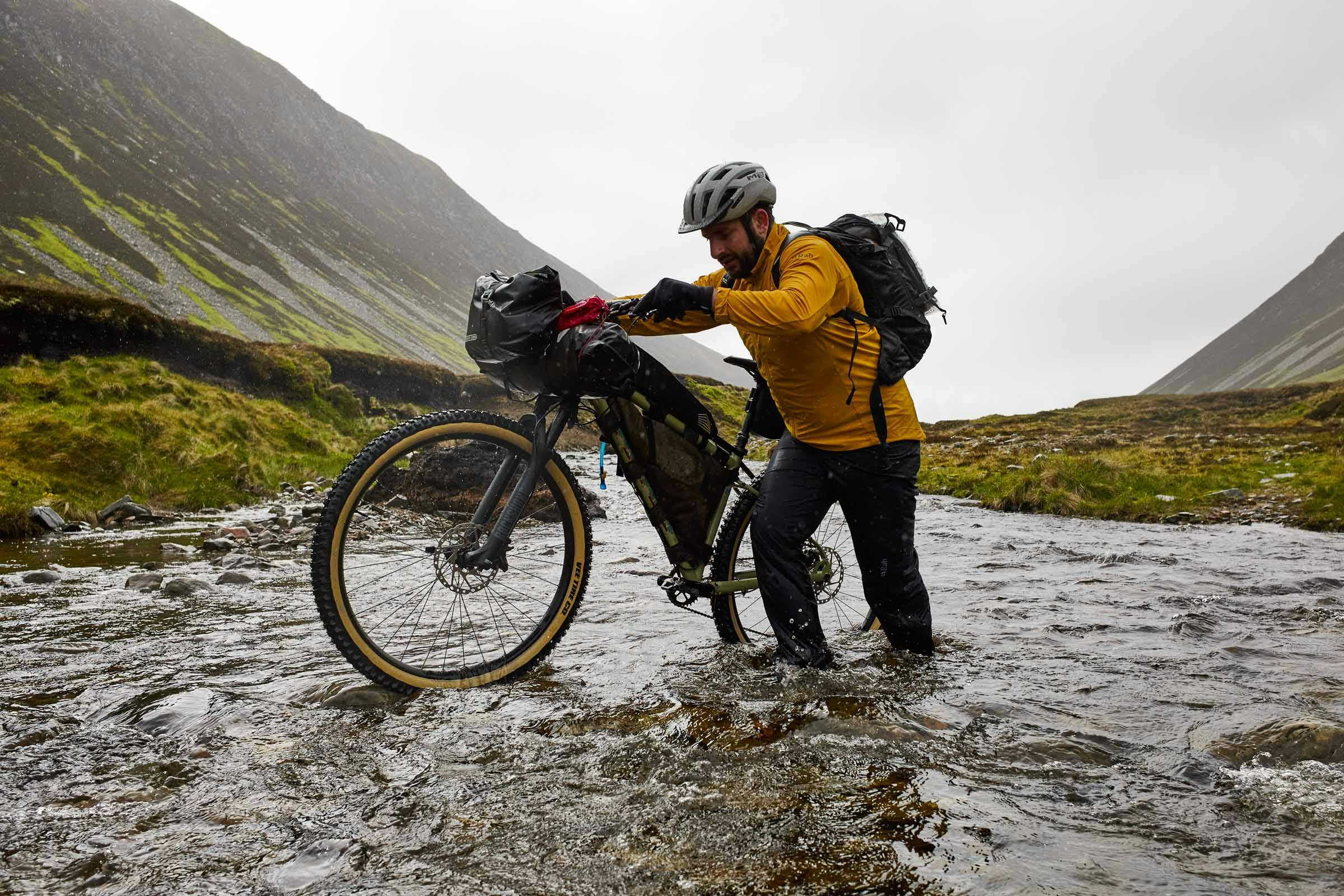

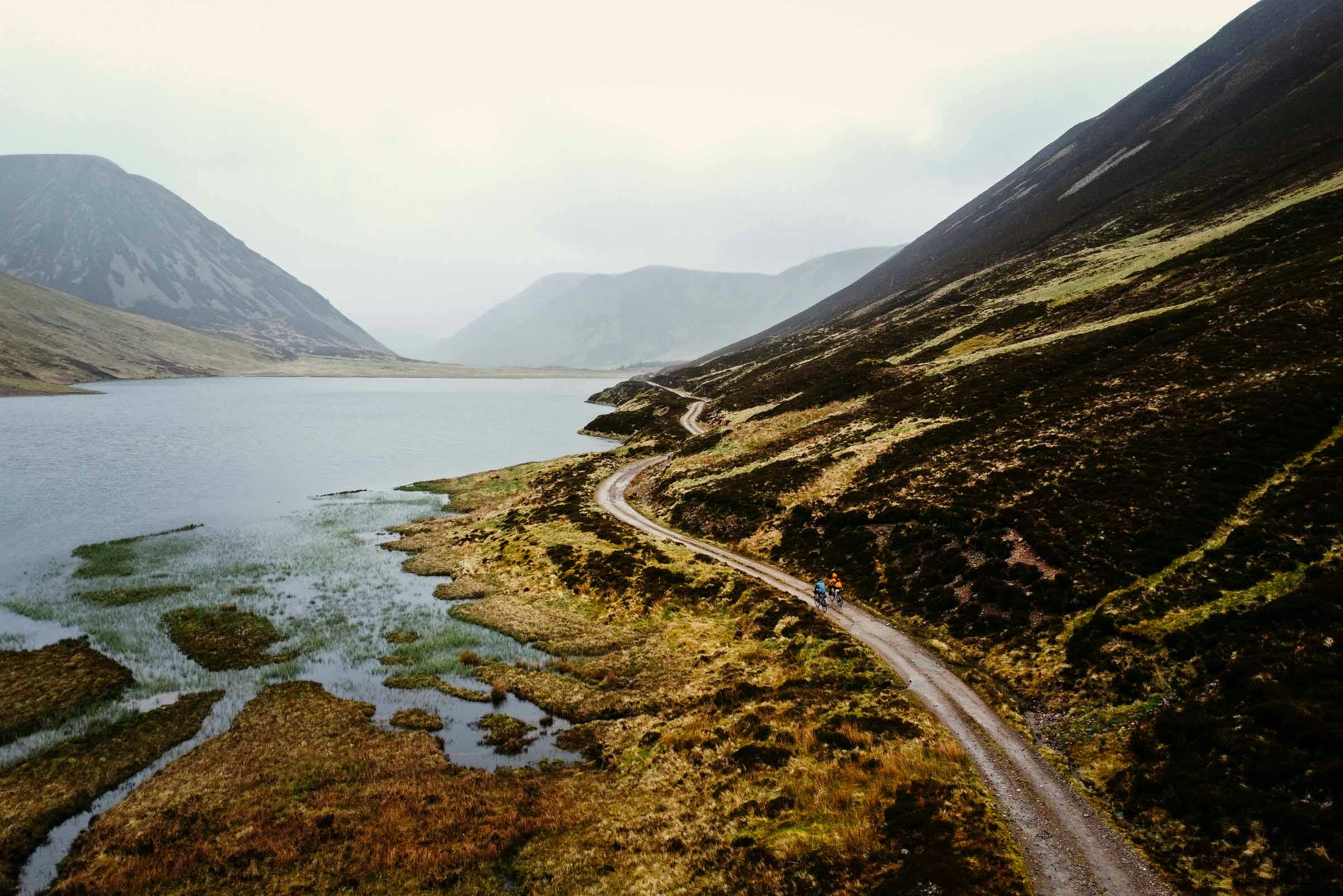

Gathering at the official sleepy start village of Blair Atholl on the outskirts of the National Park, it is difficult to picture the Cairngorms’ magnitude and remoteness. And, yet, heading into the hills proper via the gravel double-track estate roads, high bogs, and loch-skirting singletrack of the Gaick Pass, you’re amongst it straight away. The western shore of Loch an Dùin is then the first obstacle, an hour-or-two into the ride. A dense sea of contours around the loch – one of which the route follows along a trickle of shoreline singletrack – hints at what dùin might mean, and sure enough it is Scottish Gaelic for ‘enclosed, surrounded’. Looking at the OS map across Stef’s backpack, over the sprawling moorland, ancient Caledonian forest and highlighted route ahead is a further lesson in Scottish Gaelic influence – Inshriach, Feshie, Rothiemurchus – all routepoints ahead for the group on day one. Gaick Pass would present just the first of many hike-a-bike and river-crossing sections on the Loop.
“It’s not often you can ride for a whole day without seeing a single other soul, in the UK anyway…”

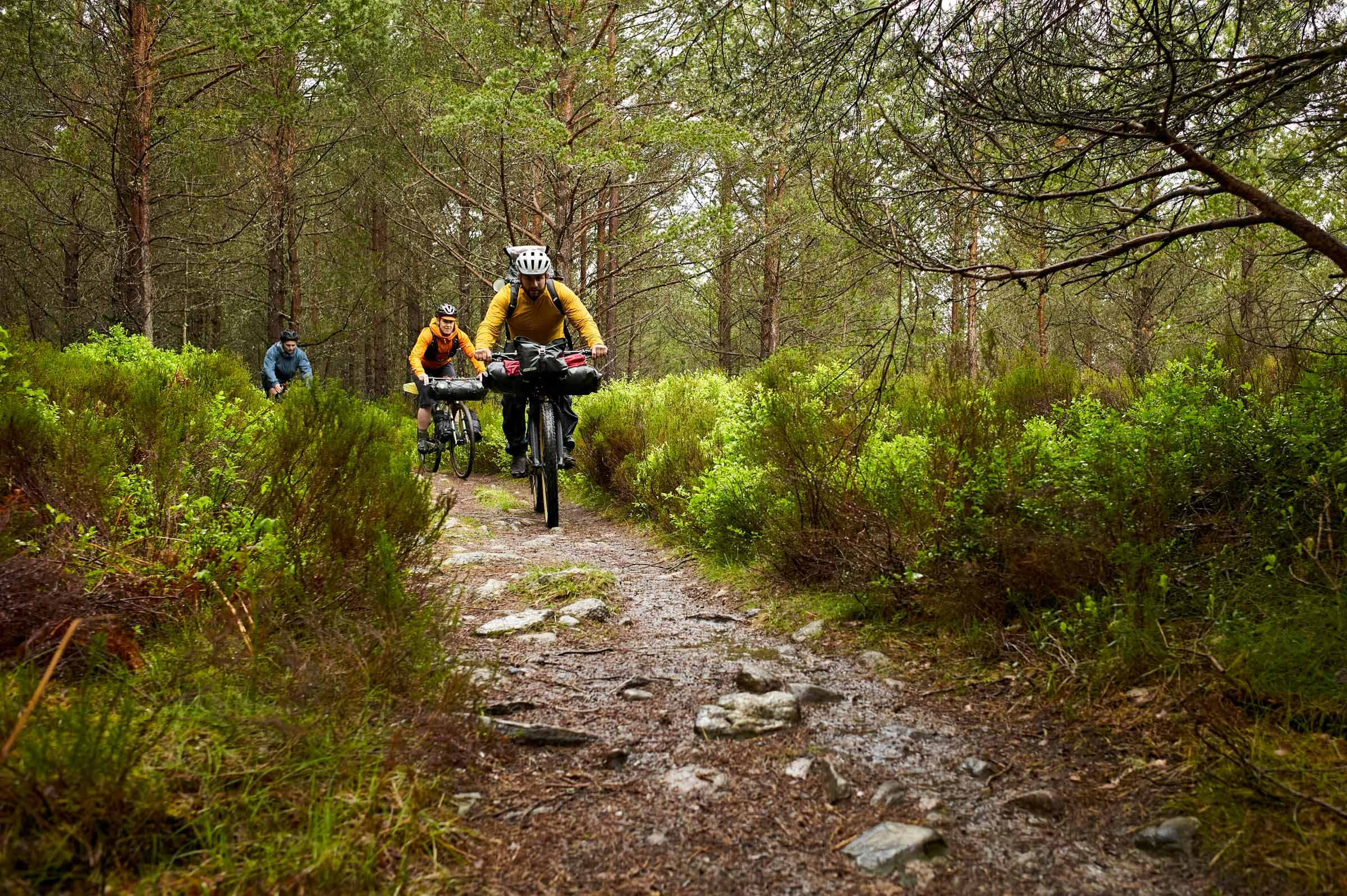







“Amid the [Cairngorm] mountains wild,
Where silence reigns supreme,
And nought disturbs the solitude,
Except the rushing steam,
There stands a lonely windswept house
Of no pretentious size.
But to the hail-slung [bikepacker]
It’s perfect paradise.” [1]
Ryvoan Bothy is a small, charming building set in a prominent position amongst the Abernethy Nature Reserve, in the shadows of several 800m peaks. Like many bothies, it was a farm / workers building and abandoned in the late 1800s. Renovated in 1967, it is one of nearly 100 Bothies that form the UK’s network of mountain and wilderness huts/shelters run by an organisation called the Mountain Bothy Association (MBA). With the bothy full of Czech hikers, it meant the guys needed to set up tents and bivvy bags outside; bothies aren’t bookable, so knowing if you even can stay in one (let alone have them to yourself) is one of life’s great unknowns. However, the shelter and cosiness of a bothy to settle, cook and socialise within makes for a good marker in exposed lands where, as Nan Shepherd says of the Cairngorms, “life has not much margin”. Bothies are very much part of the UK Outdoor Culture. These shelters, with open doors that anyone is able to use, enable both multi-day access to wild places and the most amazing locations for overnighting on bikepacking trips. “The open door of a bothy sure is a big hug at the end of a day’s bikepacking” says Stef. Tents pitched pronto, and straight into the fire-warmed small stone hut for hearty mushroom risotto as darkness descended. Having carried supplies 100-kilometres from Blair Atholl, the group tucked into a well-earned candlelit cheeseboard starter, as the risotto simmered and stirred on the rickety wooden table.
The Czech welcome tea was real good, too.








Mushroom Risotto / Olive Oil, Butter, Risotto, Garlic, Parsley
Dried Porcini ‘Shrooms, Capers, Stock Cube(s), Water, Salt/Pepper
Garnish / Croutons, Parsley, Pecorino
Dessert / Iced Ginger Cake, Custard






“The most vital thing that can be listened to here is silence”[2]
Despite being a loop, the web of interconnected glens, whose burns and rivers eventually drain into the Rivers Dee and Spey, can get wonderfully disorientating; not least because you’ll be regularly crossing rivers and watersheds. The mesmerisingly clear waters possess an “elemental transparency” as coined by Nan Shepherd in her book the Living Mountain, due to flowing from granite depths without peat to darken it as a lot of places in the UK. Shepherd notes “the sound of all this moving water is as integral to the mountain as pollen to the flower. One hears it without listening as one breathes without thinking”. You’ll sure hear enough water on the Cairngorms Loop – whether burns rushing off the hills, or white water rushing against shins and spokes on a river crossing.
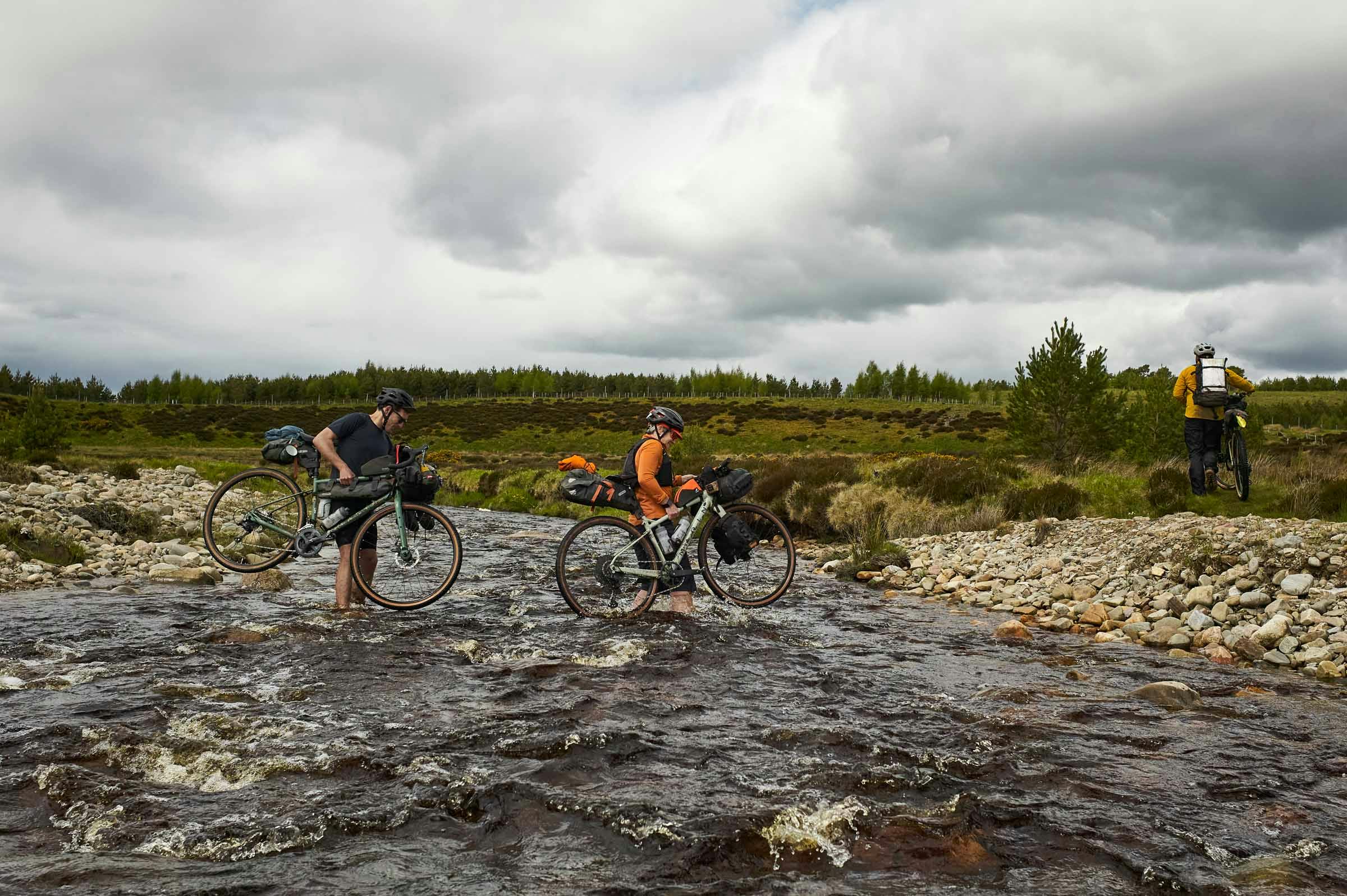

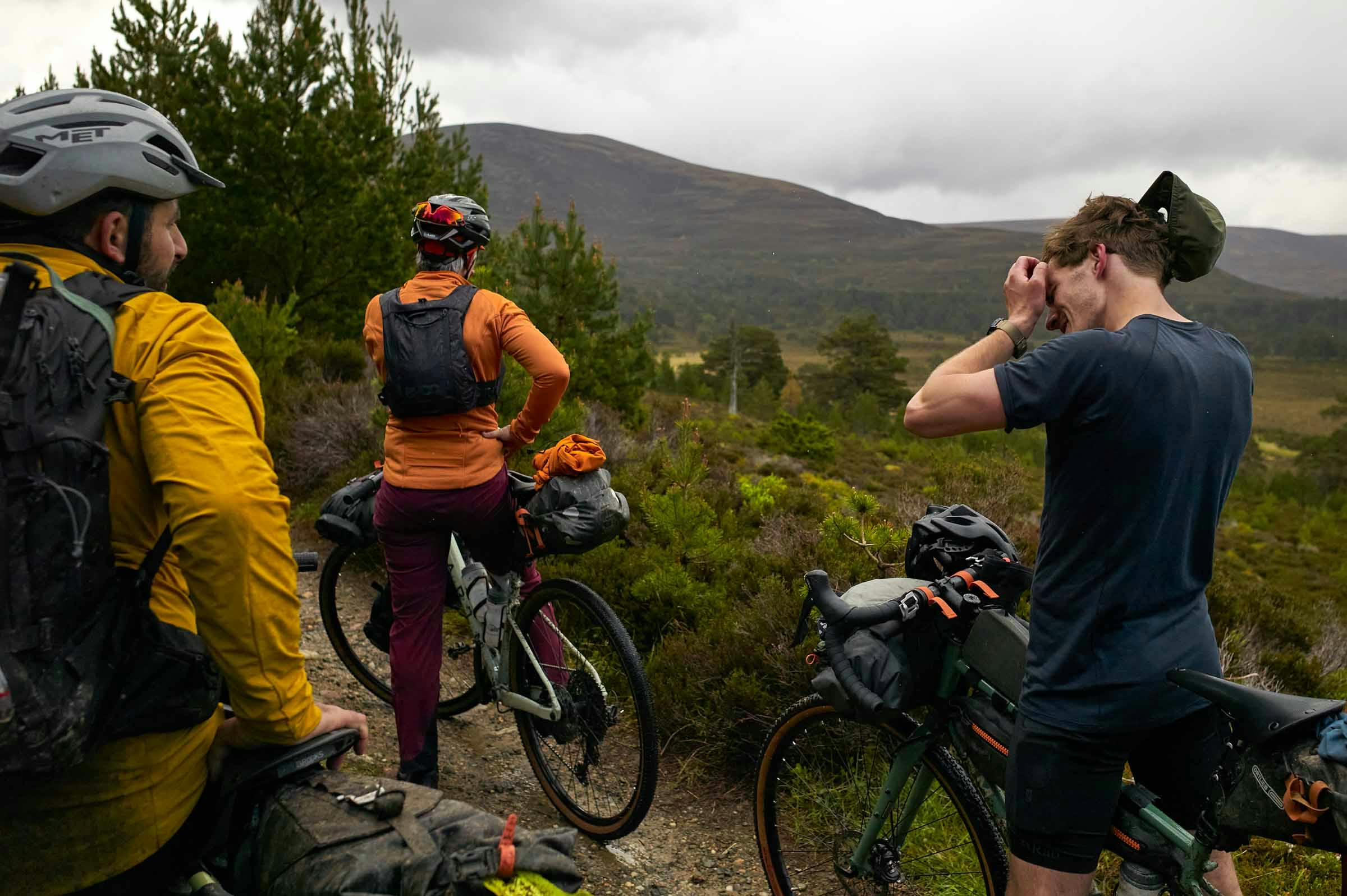
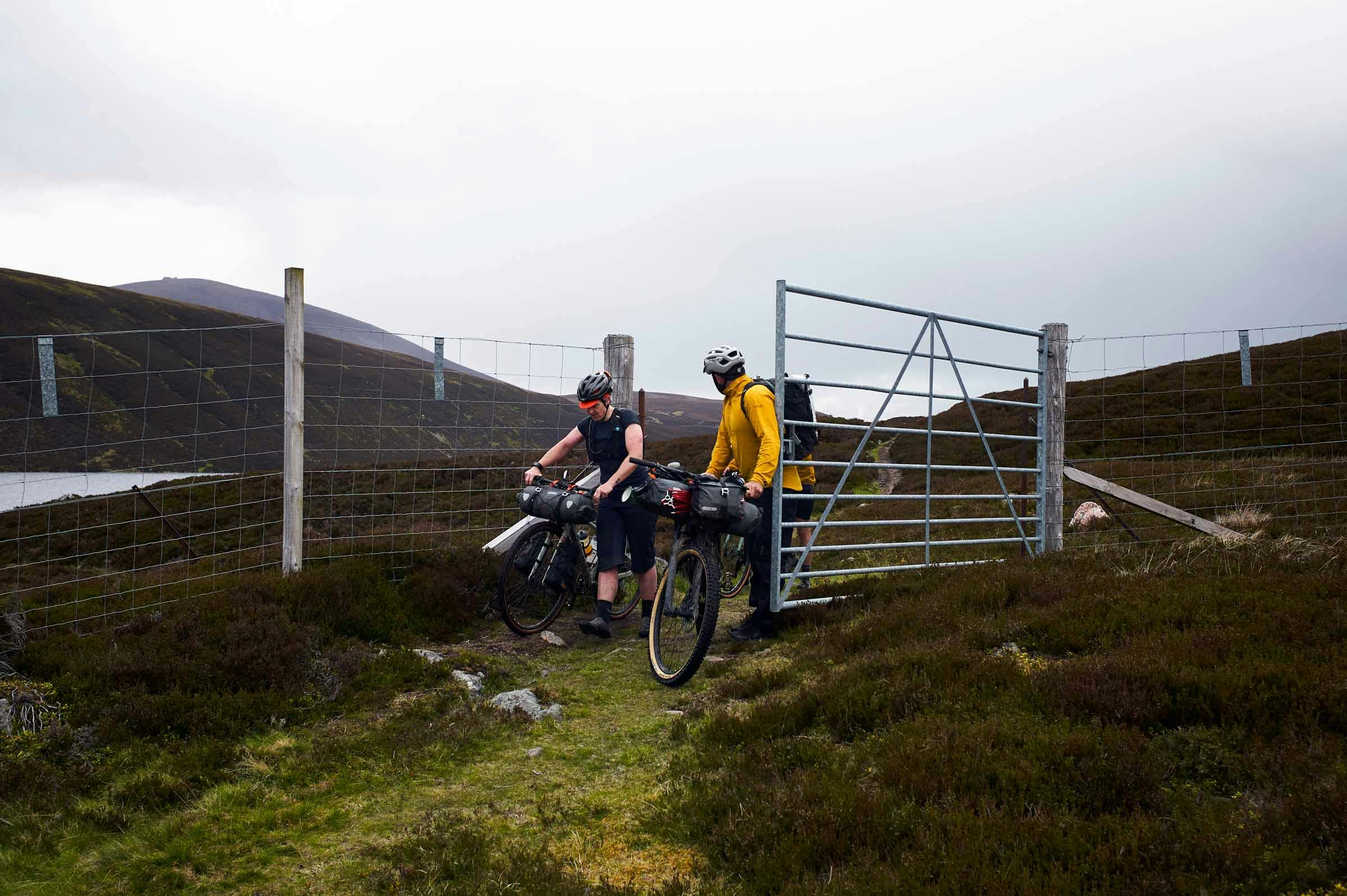

The gridded town of Tomintoul sure looks odd on a map against such organic surrounds, but is a real beacon amongst a sea of sparsity as one of only three options for shops, food and drink. It’s the highest village in Scotland by all accounts, but a rewarding point to reach on Day two for the gang to tuck into a hot meal, and resupply and the village shop before taking on the wild Glen Avon and Builg section, which includes the biggest climb (cutting up to Cullardoch (900m)) and onwards to Braemar – the Royal region of the Cairngorms.
With a set of lofty, foreboding hills to your right the whole way around the Loop, your eye constantly draws across to leading lines; penetrative tracks and trails in the landscape. Heather-clad masses of granite – once higher than the European Alps – that have been eroded to featureless rounded hills, with streams and the big rivers creating rifts in the plateau. These rifts happen to provide ace through-routes for bikepackers; “if I had to pick a favourite section, it would have to be Tomintoul to Blair Atholl – the perfect mix of fast-rolling road, gravel tracks, loch-skirting singletrack, climbs, descents, bothies, hike-a-bike, and access to the high plateau” confirms Stef. This section is a reminder that you can find flavours of wild, distant lands in the UK; the difference is simply scale. Here, you can count the chunky climbs and double-track descents in minutes rather than hours, or days.
“Riding around Cullardoch, you really get a sense for the Cairngorms’ scale, sparcity, and silence people talk of; on top of an empty world.”



Harrison / Four Corners: Marin’s mixed-terrain bikepacking machine
Leonie / DSX: Marin’s all-purpose mountain biker’s gravel bike
Stef / Pine Mountain 2: Marin’s classic steel hardtail:
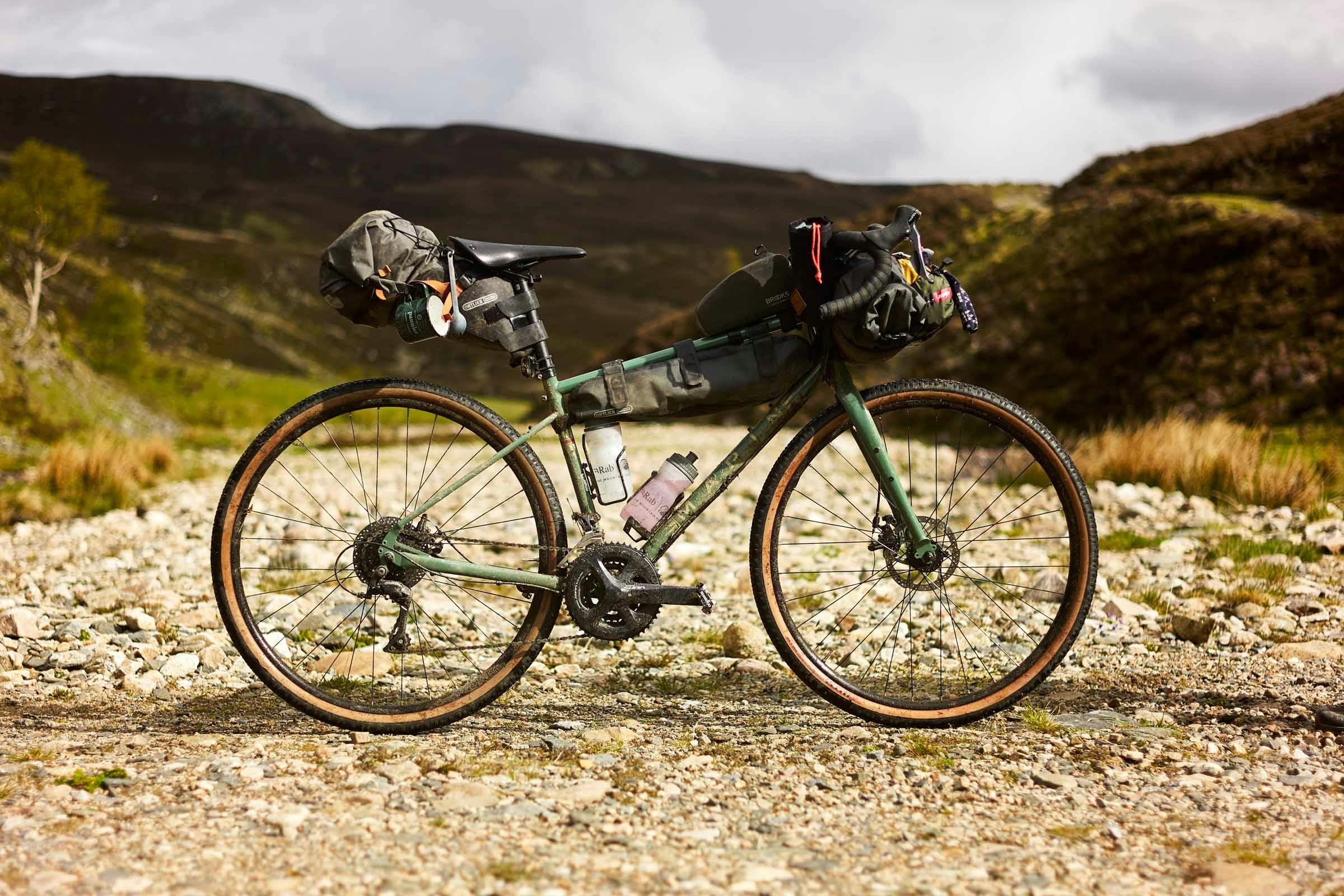

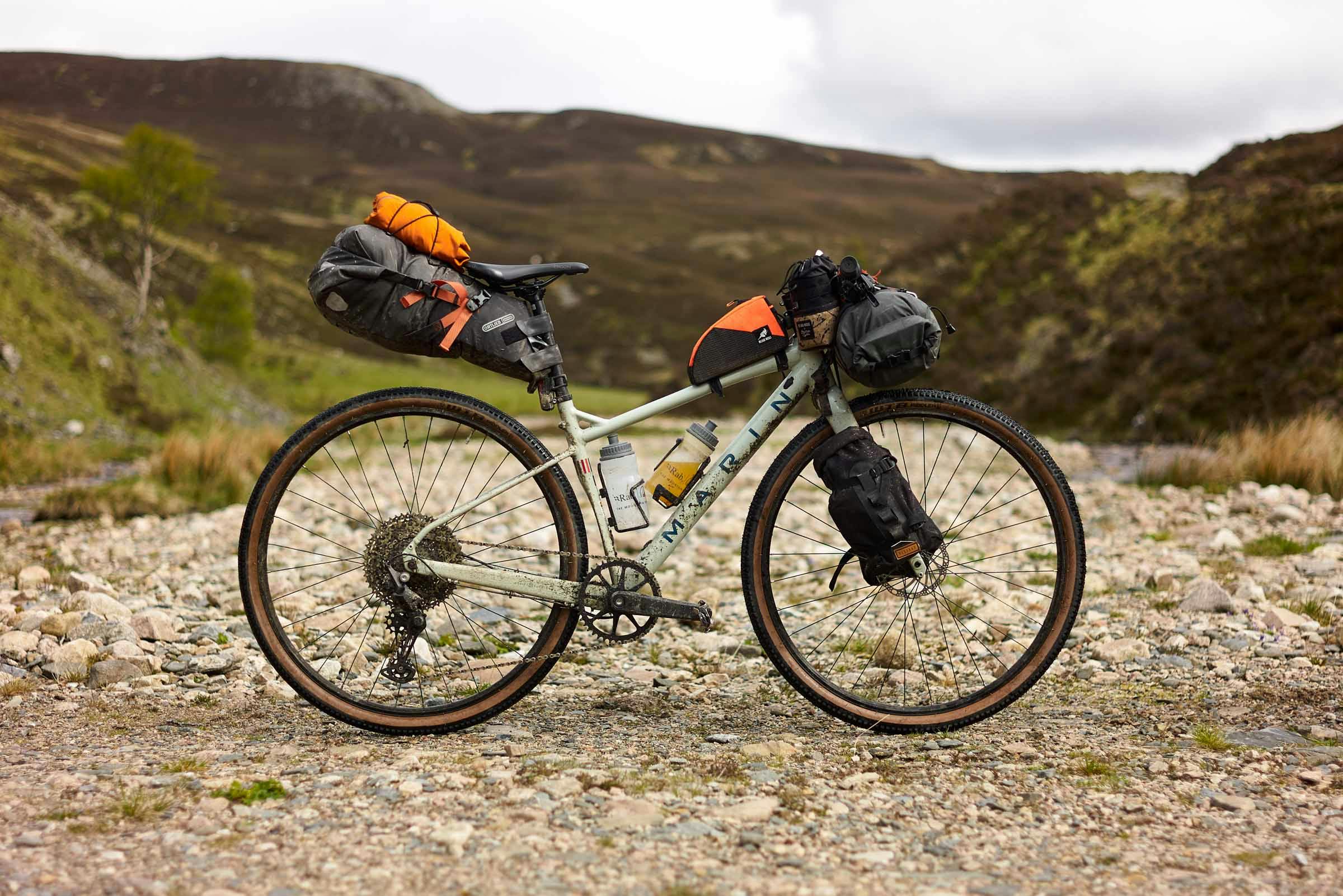
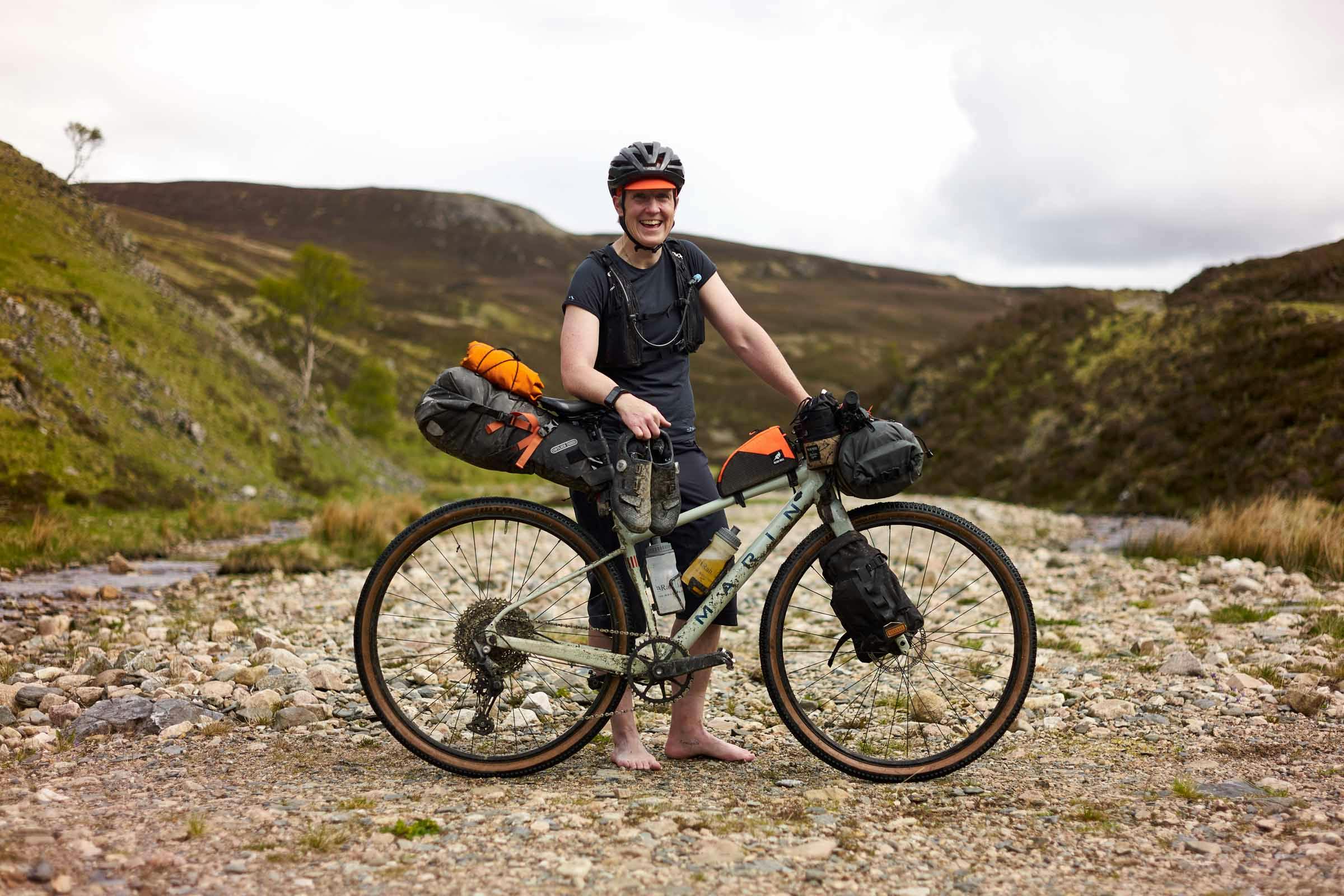
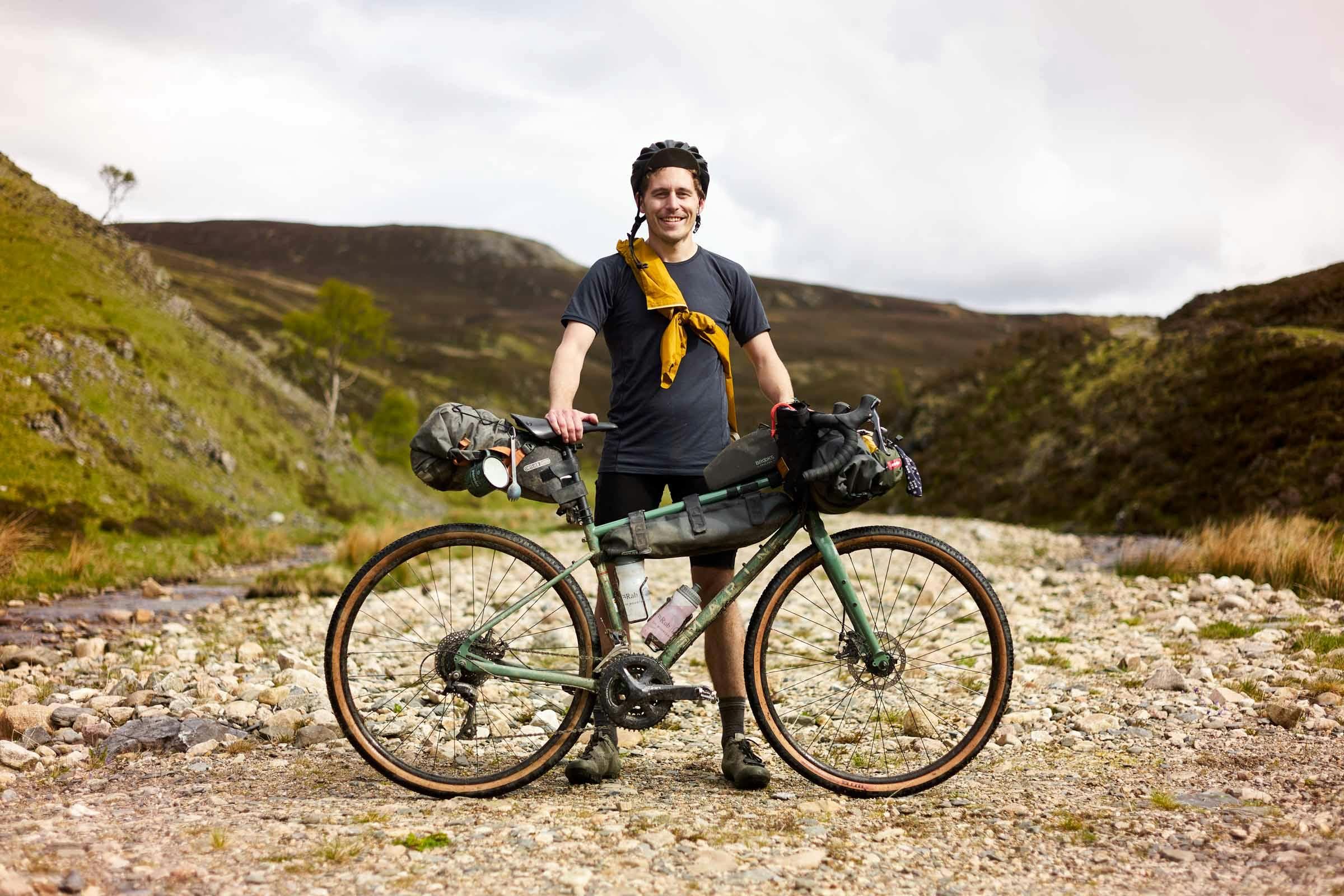
Riding bikes in the Cairngorms isn’t so much about conquering big climbs, as being amongst the mountains. The main Outer Loop sure is enough of a challenging bikepacking adventure, but if you want more and to become a true Cairngormer, take on the Inner Loop too. Either way, just go. Go to experience her tracks and trails, weathers and wildness, burns and bothies, silence and solitude. The Cairngorms Loop has everything you’d want from a bikepacking trip; arguably the UK’s finest template for an adventure by bike. One thing is for sure, the hug of a bothy is awaiting you somewhere along the way…




START/FINISH
The Loop officially starts and finishes in Blair Atholl village. There are basic stores, cafes and accommodations, and plenty more in nearby Pitlochry. Given it is a loop, you can start anywhere – Aviemore would be another good option.
LOCAL SPECIALITIES
Venison and Game. You might even spot a ‘deer larder’ along the route. Snack wise, Macaroni Pies are great, or you should dip Shortbread or Tunnocks bars into a camp coffee. Whisky, of course. There is only one distillery on route – Speyside Distillery in Drumguish (small, private) – but, fear not, there are a handful of well known distilleries like Glenlivet and Dalwhinnie nearby, if you’ve time and energy.
WILDLIFE/LANDSCAPE
Described as Britain’s ‘Arctic’, not much other than the hardiest of low-lying plants, shrubs and heather survives exposure on the Cairngorms high hills. On the lower slopes and wider valleys, you can find dense tree cover; some of which is ancient Caledonian Forest Scot’s Pine. The north-western sections of singletrack, through Inshriach and Feshie forests and around Loch an Eilein, are lovely examples. The crystal clear rivers are full of salmon, sea trout and resident brown trout, with the Dee and the Spey famed for salmon fishing too. When riding, you could play ‘I-Spy’ for: eagles, grouse and ptarmigan (pronounced with a silent ‘p’), curlews, skylarks, snipes, deer, hares and rare red squirrels.
RESUPPLY
There is absolutely nothing on this route except for Blair Atholl, Glenmore, Tomintoul and Braemar, so use those for resupply. They actually make quite good markers for staging days. That said, you can nip off the route and find things like Kingussie and Aviemore. It’s best to carry at least one meal-worth of food, just in case. Water is absolutely no problem in the Cairngorms! You’ll be wringing enough of it out of your socks. Take a water filter; be careful to drink straight from the rivers and burns.
ACCOMMODATIONS
For the ultimate Cairngorms experience, wild camping and a night in a bothy should be on your list – just follow the ‘leave no trace’ principles in these sensitive environments. Wild camping is permitted in Scotland. Join the Mountain Bothy Association (MBA) for bothy locations and to support the organisation. Hotels, Hostels, B&B’s and Campsites exist in Blair Atholl, Glenmore, Tomintoul and Braemar.
GETTING THERE/BACK
Blair Atholl is on the main train-line, and is a 1.5H drive from both Edinburgh and Inverness.
CLIMATE/RIDE SEASON
Any time between April – October is possible but, the shoulder seasons (April-June and September-October) are the best time to ride the Cairngorms Loop – for the longer days, favourable weather, and fewer midges. Winter conditions rule out bikepacking in the Cairngorms for most due to snow, freezing temperatures and swollen rivers. That said, four-seasons in one day isn’t unheard of at any time of year! River Crossings are a serious consideration on the Loop. Loaded bikes can be a good asset for crossing rivers, though – great to lean on – just avoid submerging moving parts with bearings, like wheel hubs and bottom brackets. Whether you agree with it, or not, respect deer stalking (July-October) and grouse shooting (August-December) seasons. Stick to roads, tracks and trails.
EQUIPMENT
You’ll need to be self-sufficient – shelter (camping kit) and some food supplies – and prepared for all weathers with emergency kit (first aid and survival blankets). Whilst possible to do the Cairngorms Loop without camping, it leaves zero room for any setbacks! Good shoes you can ride, hike and ford rivers in are essential, as is a midge net and a tick (small insect) remover.
WHAT BIKE TO RIDE?
You could ride the Outer Cairngorms Loop on anything from a gravel bike to a full-suspension mountain bike. Stef and Jordan rode 29er mountain bikes, whilst Leonie and Harry rode gravel bikes with 42c (42mm-wide) tyres. On the Outer Loop, given the mix of trails, it is slower but comfier to be overbiked and somewhat fun and challenging to be underbiked. The Inner Loop is definitely mountain bike territory.
ROUTEMAKER
The ‘Cairngorms Loop’ is officially Steve Wilkinson’s concept, evolving from the ‘Tour of the Cairngorms’ route. Colin Cadden now helps with its stewardship and annual mass group-start event, typically in Spring.

Bikepackers
Leonie Webster
Harrison Cox
Jordan Gibbons
Stef Amato
Photography
Jordan Gibbons
Stef Amato
Words
Stef Amato
Quotes
[1] – Anonymous – Corrour Bothy Book, 1939
[2] – Nan Shepherd – The Living Mountain, 1977
Bibliography
The Cairngorm Glens – P. Koch-Osborne
The Living Mountain – N. Shepherd
A Camera in the Cairngorms – W.A. Poucher
Commercial Partner(s)
Marin Bikes
Rab
RAINSPOTTING
Six of us alight the sleeper train at Corrour - the highest, remotest station on the West Highland Line - and 'go for a w̶a̶l̶k̶ ride' through the wintry, gloomy Grampian Mountains of Scotland. We track the old-established north-south drove roads and, in true drover style, explore the alluring moorland voids in between...
by STEFAN AMATO & DAVID SEAR
ESCAPE TRACKS: NORTH YORK MOORS BIKEPACKING
Katie, Stef and Duncan take the train to the coast - the end-of-the-line at Scarborough - and escape on an overnight bikepacking adventure into the heart of the North York Moors National Park...
by STEF AMATO & DUNCAN PHILPOTT
BIKEFISHING THE SECRET DALE
Bikefishing? Oh yes. We strap fishing rods, flies, and overnight kit to our gravel bikes for a bike-fishing journey along the River Nidd. Along the way, we meet up with Nidderdale AONB fly fisherman, Oscar, who takes us upstream fishing in the river and stillwater fishing at the local upland reservoir. Time to see what the bike fishing hype is all about...
by STEF AMATO & DUNCAN PHILPOTT
RAINSPOTTING
Six of us alight the sleeper train at Corrour - the highest, remotest station on the West Highland Line - and 'go for a w̶a̶l̶k̶ ride' through the wintry, gloomy Grampian Mountains of Scotland. We track the old-established north-south drove roads and, in true drover style, explore the alluring moorland voids in between...
by STEFAN AMATO & DAVID SEAR
ESCAPE TRACKS: NORTH YORK MOORS BIKEPACKING
Katie, Stef and Duncan take the train to the coast - the end-of-the-line at Scarborough - and escape on an overnight bikepacking adventure into the heart of the North York Moors National Park...
by STEF AMATO & DUNCAN PHILPOTT
BIKEFISHING THE SECRET DALE
Bikefishing? Oh yes. We strap fishing rods, flies, and overnight kit to our gravel bikes for a bike-fishing journey along the River Nidd. Along the way, we meet up with Nidderdale AONB fly fisherman, Oscar, who takes us upstream fishing in the river and stillwater fishing at the local upland reservoir. Time to see what the bike fishing hype is all about...